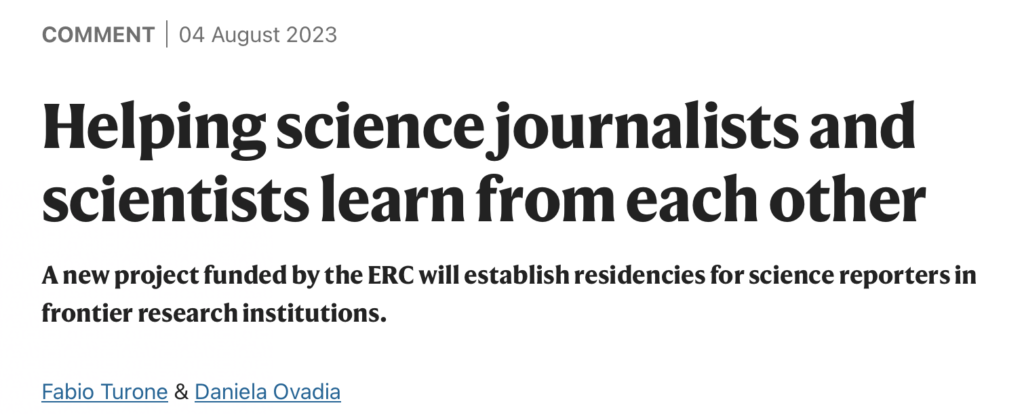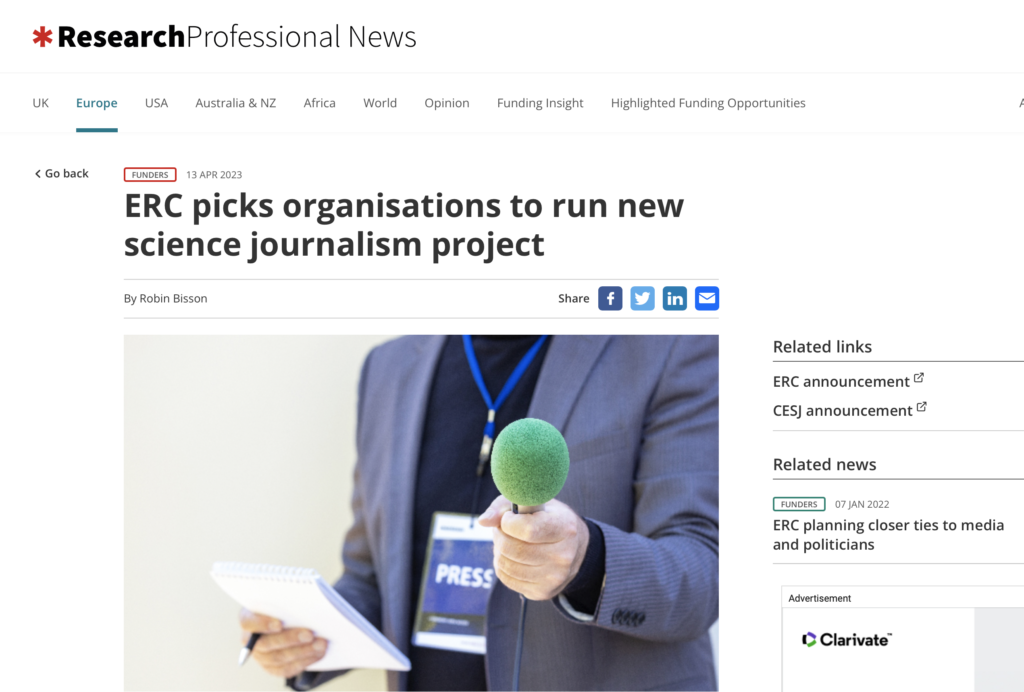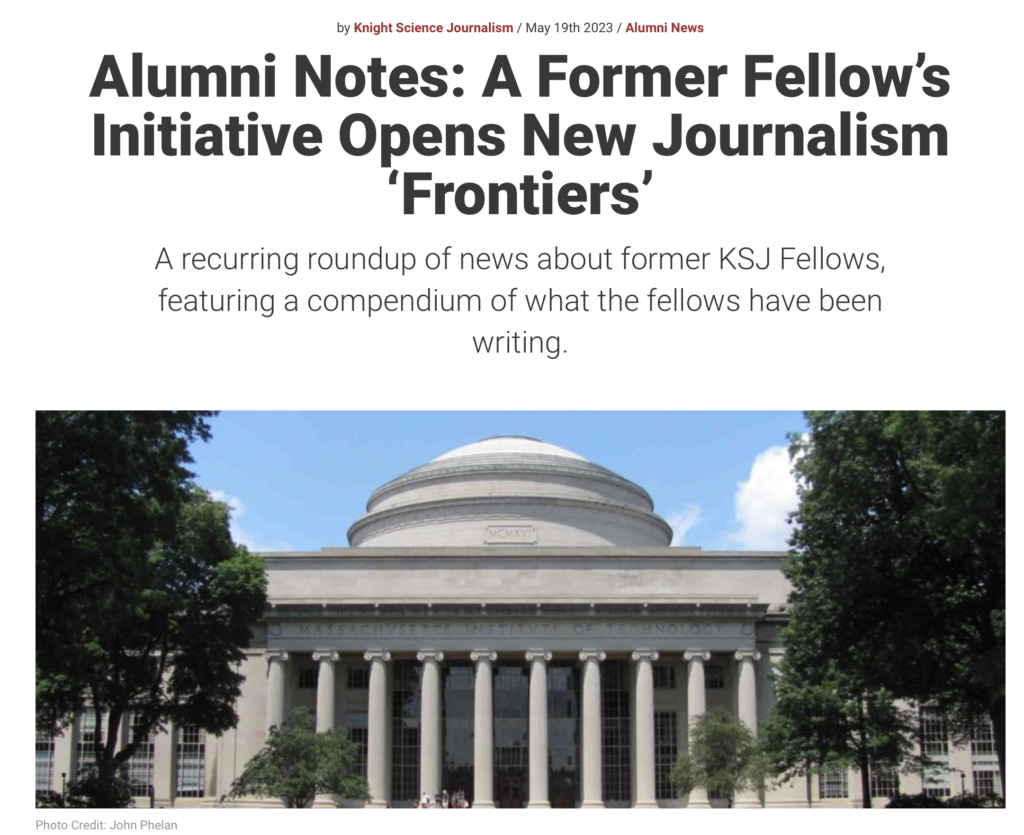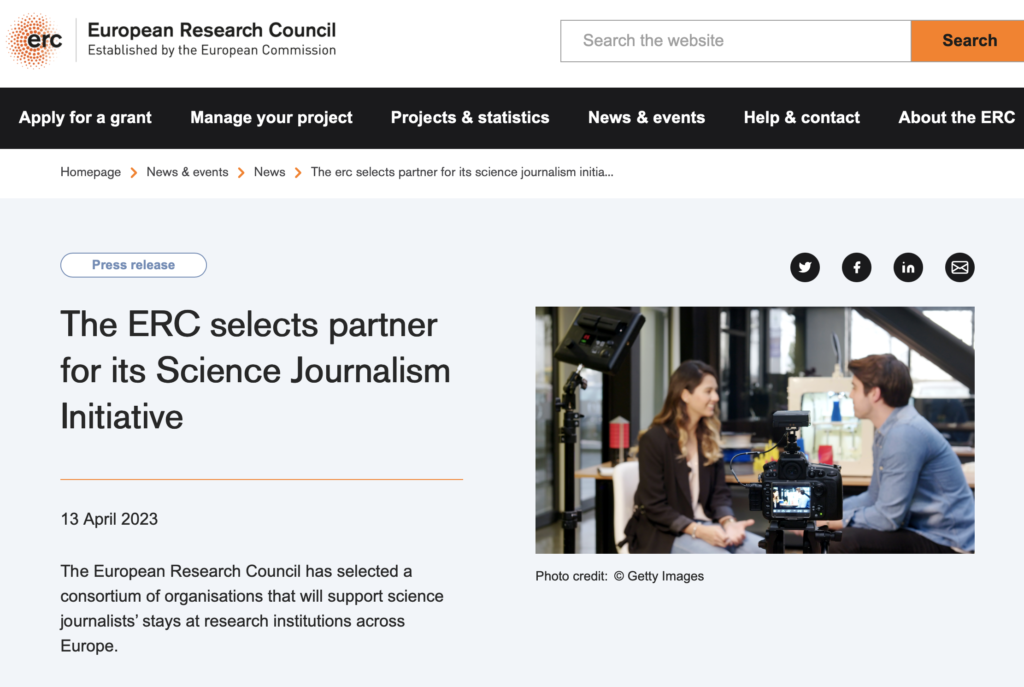Frontiers – ERC Science Journalism Initiative
The Center for Ethics in Science and Journalism is among the partners of the FRONTIERS consortium that was selected by the European Research Council for a grant of 1.5 million euro to establish a residency program for science journalists in research institutions across Europe, and measure its impact on the lifelong professional development of science journalism in Europe. The consortium also includes the NOVA University of Lisbon (Portugal), the Pompeu Fabra University (Spain), and Enspire Science (Israel), which coordinates the project.
CESJ è partner del consorzio FRONTIERS che è stato selezionato dall’European Research Council per un grant di 1,5 milioni di euro per creare un programma per permettere a giornalisti scientifici di trascorrere dai 3 ai 5 mesi “in residence” in istituzioni di ricerca in tutta Europa, e per misurare l’impatto sullo sviluppo professionale del giornalismo scientifico nel continente. Il consorzio comprende anche l’Università NOVA di Lisbona (Portogallo), l’Università Pompeu Fabra di Barcellona (Spagna), e Enspire Science (Israel), che coordina il progetto.
LATEST NEWS
FRONTIERS launches dedicated call for early-career science journalists
FRONTIERS announces a new call for applications for its Science Journalism in Residency Programme, funded by the European Research Council (ERC). This
third call is exclusively aimed at early-career journalists and will remain open until May 6, 2025, at 17h00 CEST. (… follows…)
FRONTIERS APRE UN NUOVO BANDO DEL PROGRAMMA DI RESIDENZE PER GIORNALISTI SCIENTIFICI
FRONTIERS opens new call for science journalism in residency program
IN THE MEDIA
The FRONTIERS project (Fellowship Residencies Offering science News professionals Tools and training for Independent and Ethical Reporting on Science) won an open call for proposals and benefits from a very strong presence of science journalists.
“FRONTIERS is an interventional project and a research project at the same time” said Daniela Ovadia, scientific director of CESJ. “The research team will collect quantitative and qualitative data on the existing residency programs for science journalists, and CESJ will specifically work on a set of best practices and ethical guidelines for the professional development in science journalism, based on the principles of journalistic independence, that will be applied by both hosting institutions and residents. We will also develop and apply a set of measures of impact of the project on the professional community and the society”.
CESJ will oversee the development and implementation of the residency program, and will also provide matchmaking services to help journalists find hosting institutions. “We will reach out to the whole research community in Europe and contact the institutions that have already launched similar programs” explains Fabio Turone, executive director of CESJ. “This is the first EU-funded project specifically aimed at supporting independent science journalism. We hope that it will demonstrate how institutional support can change the landscape of science journalism in Europe by promoting capacity building and lifelong learning opportunities for the many professionals who aim for the highest qualitative and ethical standards”. As a legacy of the project, CESJ will also develop a long-term sustainability model.
The project is set to run from 2023 to 2027, and is expected to offer up to 40 fellowships to early career, mid-career and established science journalists, who will have the opportunity to spend 3-5 months with research teams or work on their reporting projects at institutions of their choice. Universities and research centers conducting frontier research in any field of knowledge will be able to participate in the program, which will provide training on independent and ethically responsible science coverage, and promote mutual learning between journalists and researchers.
Maria Leptin, ERC President, said: “Quality journalism is necessary to safeguard democracy, which is our collective responsibility. All institutions and bodies should contribute, and the ERC is certainly no exception. I hope we can send a strong signal to the research and media communities – and beyond.”
The Center for Ethics in Science and Science Journalism (CESJ) is a non-profit organization launched in 2016 in Milan (Italy) to foster research, public debate and education activities – for both journalists and scientists – on science and science journalism and communication. In its first years of activity, CESJ focused on how to cover science-related issues, and especially controversies, in a responsible, ethical way. CESJ is directed by Fabio Turone, science journalist who in 2016-2017 was research fellow at the MIT Knight Science Journalism program in Boston, and scientific director Daniela Ovadia, who in addition to working in science journalism has been participating in several EU-funded projects and teaches “Ethics of research and responsible research and innovation” at University of Pavia.
For contacts: frontiers@cesj.eu
The official website of the project – at Frontiers.media – is currently under construction.
See also The ERC selects partner for its Science Journalism Initiative




